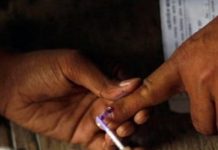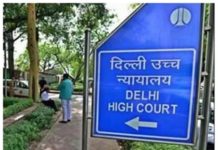 On a day India celebrated its 72nd Republic Day, the two-month old peaceful agitation of farmers turned violent as thousands of peasants broke police barricading, deviated from pre-agreed routes and reached the historic Red Fort where they hoisted their religious flag.
On a day India celebrated its 72nd Republic Day, the two-month old peaceful agitation of farmers turned violent as thousands of peasants broke police barricading, deviated from pre-agreed routes and reached the historic Red Fort where they hoisted their religious flag.
Chaos peaked when farmers in over 20 tractors entered the Red Fort’s forecourt, climbed its ramparts and hoisted their religious flag as policemen deployed there watched helplessly. The Prime Minister addresses the nation every year on Independence Day from the ramparts of the Red Fort. Repeated attempts were made by the protesters to hoist the religious flag on the domes of the Fort even as some of them indulged in sabre rattling in a show of strength. However, the police later managed to clear the place of protesters who were also seen waving the national flag.
The visuals aired on TV news channels did upset many supporters of the farmers though the peasants said they only wanted to send a message to the government. Earlier, police and aggressive farmers clashed at several places including the Singhu border, Mukarba Chowk, ITO, Akshardham temple and Nangloi forcing the security personnel to resort to lathi charge and lob teargas shells to disperse the crowd. Many farmers were seen pelting stones at the police at ITO where two persons were spotted driving the tractors at high speed to scare the security deployment.
 The police filed 25 cases and was trying to identify those behind the violence in which around 86 security personnel were injured. One farmer died when a tractor overturned while moving towards old Delhi, while several peasants and over 80 police personnel were reportedly injured during the clashes.
The police filed 25 cases and was trying to identify those behind the violence in which around 86 security personnel were injured. One farmer died when a tractor overturned while moving towards old Delhi, while several peasants and over 80 police personnel were reportedly injured during the clashes.
The joint front of farmers, which had assured the police that the tractor rally would remain peaceful, later distanced itself from the violent protesters and clarified that unsocial elements had infiltrated its ranks to give a bad name to the peaceful protest.
The six-month old agitation and the two-month old protests at Delhi’s borders had led to the current situation, said the farmers front.
“I urge you to maintain peace. If peace breaks down our agitation will be weakened,” Swaraj India chief Yogendra Yadav appealed to the farmers.
Concerned over the developments, Union home minister Amit Shah reviewed the situation with senior officials including home secretary Ajay Bhalla and Delhi Police Commissioner SN Shrivastava.
The police had deployed drones to monitor the farmers rally which was welcomed by the locals who showered flower petals at several places. Other curious passersby took photos and made small videos of the passing tractors.
As chaos unfolded, several Delhi Metro stations were shut, Internet services were suspended in parts of city and New Delhi was put on high alert with several companies of paramilitary forces on standby as a security measure.
High alert was also sounded in Punjab and Haryana, from where bulk of the protesting farmers have been camping at Delhi’s borders.
Punjab Chief Minister Amarinder Singh appealed to the farmers to return to the borders while Haryana Chief Minister ML Khattar said the peasants had freedom to protest but not to spread anarchy.
Earlier, the central government had urged the Supreme Court to stop the tractor rally saying it would be an embarrassment to the nation.
Later, the tractor rally was allowed by the Delhi Police with conditions after the farmers refused to withdraw their protest move against the three contentious farm laws.
The rally was to be held over a 60 km stretch near the Singhu, Tikri and Ghazipur borders and was scheduled to start after the Republic Day Parade ended.
The Delhi police commissioner blamed the farmers for loss of property during the rally and urged them to return to the borders peacefully. “The time and routes for the tractor rally were finalized after several rounds of meetings. But the farmers drove tractors off the routes and before the fixed time, leading to vandalism in which many police personnel were injured,” Shrivastava said.
Before the police granted permission to the rally, it noted that around 308 Twitter handles originating from Pakistan had been identified as they were trying to mislead the farmers.
The violence by farmers invited criticism from the opposition parties who slammed the centre for not fulfilling its responsibility.
Nationalist Congress Party chief Sharad Pawar, who had extended support to the cause at a huge rally at Azad Maidan in Mumbai on Jan 25, said: “Nobody will support whatever happened today but the reason behind it cannot be ignored either. Those sitting calm grew angry, the centre did nothing to fulfil its responsibility. Government should act maturely.”
Congress leader Rahul Gandhi urged the centre to take back the three farm laws saying “Violence is not a solution to any problem. If anyone gets hurt, our nation will suffer. Take back the anti-farmer laws for the benefit of the country.”
Congress spokesperson Randeep Surjewala said the Delhi violence had stunned everyone and such acts had no place in a democracy.
West Bengal chief Minister Mamata Banerjee blamed the centre for being insensitive.
The AAP government in Delhi too criticized the violence but blamed the central government for the unfortunate turn of events and ignoring the issue for two months.
The farmers, who have been protesting across Delhi’s borders since November 26, 2020, had assured the police that the tractor rally to enter the national capital from various points would remain peaceful and in no way disregard the sanctity of the Republic Day.
The tractor parade, to coincide with the Republic Day Parade, was to highlight the plight of the farmers and to reiterate their demand for repeal of the three farm laws.
The deadlock between the agitating farmers and the government over the three farm laws has remained unresolved despite 11 rounds of negotiations between peasant representatives and union agriculture minister Narendra Singh Tomar and railway minister Piyush Goyal.
The matter went to the Supreme Court which suspended the three laws and set up a panel of four experts who were to discuss the issue with the farmers and suggest solutions in two months.
 The farmers had welcomed the suspension of laws but rejected the panel saying all the four members had earlier backed the three laws and could not be trusted with negotiations.
The farmers had welcomed the suspension of laws but rejected the panel saying all the four members had earlier backed the three laws and could not be trusted with negotiations.
Though the government has offered to put on hold the three laws for 18 months, the farmers want nothing less than a withdrawal.
Also, the farmers want the government to provide legal backing to the system of Minimum Support Price under which the state agencies procure food grains at specified rates from the farmers every year.
The farmers defied the top court’s appeal to withdraw their agitation and in a mark of protest burnt one lakh copies of the laws in various bonfires on the occasion of Lohri festival.
The expert panel rejected by the farmers included Bharatiya Kisan Union leader Bhupinder Singh Mann, who later recused himself, agricultural economist Ashok Gulati, Pramod Kumar Joshi of the International Food Policy Research Institute and Shetkari Sangathan leader Anil Ghanwat.
Former Chief Justice of India RM Lodha declined to head the panel which was described by the farmers as a central government ploy to divert attention from the demands raised by the peasants.
BKU leader Balbir Singh Rajewal said the protesters would not go back till the three farm laws were repealed.
Though the farmer agitation has remained apolitical, it has been supported by almost all the opposition parties who have charged the government with ignoring the plight of the food growers.
The Congress, Trinamool Congress and the Communist Party of India-Marxist criticized the SC move to form an expert panel saying it would not lead to any solution and would rather complicate the issue.
The protests which generated huge sympathy for the farmers across the country saw as many as 78 deaths at the protest site and led the SC to remark that it was extremely disappointed by the government’s handling of the crisis.
The farmers have dubbed the three farm laws anti-peasant and pro-corporate while the centre describes the legislations as pro-reform moves aimed at benefiting the farmers.
The government says the laws could not be rolled back as they have been passed for the entire country and not just a few states. The government also points out that several farmer groups across the country had welcomed the farm laws.
In turn, the protesting farmers reminded the centre that agriculture was primarily a state subject and the states should frame farm laws instead of the centre.
However, there has been some agreement as well. The government has agreed to demands of farmers over regulating power subsidy as per the electricity amendment bill and the imposition of fine for stubble burning which chokes the Delhi-National Capital Region every year.
The protests across Delhi’s borders with Haryana and Uttar Pradesh completed two months on January 26. During this period, the farmers braved intense cold wave conditions and winter rains to press for their demand.
Though several political parties supported the cause, the peasants showed wisdom in keeping their protests apolitical, people driven and peaceful.
In the initial days, there were some attempts to brand the farmers as Khalistanis (Sikh separatists) and Maoists (Left-wing extremists) but their persistence paid off.
The government though said it will submit Intelligence Bureau reports before the SC to support its claim that Khalistanis had infiltrated the farmer protests.
The apex court had also alerted the centre to check the spread of Covid-19 at the protest sites across Delhi’s boundaries at the Singhu and Tikri borders with Haryana and Ghazipur border with UP.
After the tractor rally, the farmers have plans to gherao the Parliament on February 1 when the government will present the Union Budget 2021-22 on February 1. But whether they are allowed to do so remains to be seen.
Talk to farmers
While the farmers have been persistent with their demands, the centre has blamed the opposition parties of misleading the peasants but did little on its part to explain the new laws to the food growers.
Farmers were suspicious as the new farm laws were rushed through in September 2020 just like the controversial demonetization in 2016 which had put people in great difficulty but brought no benefit to the system as claimed by the government.
It would have been better if detailed consultations with farmers were held before passing the laws but nothing much was done to take them into confidence even after the laws were passed.
The agitated farmers disconnected power from the towers of Jio telecom in Punjab forcing the private company to clarify it had no intentions of entering the farm sector. This was akin to damaging public property and disrupting public services.
The Congress party accused the government of trying to tire out the protesters by continuing to hold consultations without resolving the issues in the hope that stretching the protests will lead to fizzling out of the agitation on its own.
Congress chief Sonia Gandhi slammed the centre over deaths among the protesting farmers saying the government was paying only lip service to their welfare but doing nothing to solve their problems.
In order to associate them with the protest and to get some mileage, some Congress MPs from Punjab staged a separate dharna at Delhi’s Jantar Mantar and later briefed party leader Priyanka Gandhi Vadra over the developments.
Rahul Gandhi compared the ongoing protests to the days of the freedom struggle. “The country is going to face a Champaran like tragedy once again. Then there was the British company the farmers had to fight with, now it is Modi’s friends’ companies. But every farmer is a satyagrahi who will continue to fight for his rights,” Rahul said.
As pressure mounted on the centre, a BJP delegation from Punjab met PM Modi and union home minister Amit Shah ahead of the farmers-ministers talks on January 8 and later alleged the farmers were not interested in finding a solution.
The RSS backed Bharatiya Kisan Sangh too said it will launch a drive from January 26 to make farmers aware about the farm laws.
Not to be left behind, the Shiromani Akali Dal, which parted ways with the BJP over the three farm laws, blamed the centre for neglecting the protesters.
Former union minister Harsimrat Kaur Badal said the government had lost the trust of the entire farming community and urged PM Modi to directly talk to the farmers saying the discussions with agriculture minister Tomar were not yielding results.
Her husband and SAD president Sukhbir Singh Badal claimed that 40 farmers who had died in the protests belonged to the Akali Dal. The farmer unions were quick to rubbish his claims.
The farmer protests threatened the BJP-JJP coalition government in Haryana with a miffed JJP leader and deputy chief minister Dushyant Chautala expressing his concerns before PM Modi and union home minister Amit Shah.
Concerned over emotional stress among the protesting farmers which led to three suicides and one attempt to suicide some volunteers reached the protests site and started counseling sessions with the farmers to help them cope up with the challenge.
Minster Tomar also met religious leader Baba Lakha Singh, who offered to mediate in the deadlock but the farmers claimed he wasn’t representing them. Baba Lakha Singh belongs to the same sect as Baba Ram Singh who killed himself last month amid the protests.
Concern over MSP
The farmers want the government to include MSP in the laws and are not satisfied with the offer of a written assurance that the system will continue.
As per the MSP system, the government purchases food grains, mainly wheat and rice besides some other crops, on a minimum support price fixed by the Commission for Agricultural Costs and Prices.
Over the past decades, most of the wheat and rice purchased at MSP has taken place in the government owned mandis or the Agriculture Produce Marketing Committees in Punjab and Haryana.
This brought prosperity among the farmers in the two northern states who fear that the new laws will bring in private players and reduce government purchase on MSP, impacting their income.
This explains why the majority of the protesting farmers in Delhi belong to Punjab. But they have also been joined by farmers from Haryana, western UP, Uttarakhand and other states indicating there is something serious which is bothering the peasants.
In a way, the protests moved beyond the wheat-paddy growing farmers of Punjab and Haryana to sugarcane growers of western UP who want an early clearance of their pending dues besides MSP for other crops.
Many of the UP farmers claimed they are forced to sell their produce to private players at below MSP due to non-functional mandis in the state. The farmers further said if they try to sell their produce in the mandis of neighbouring Haryana, they are not allowed to do so.
Earlier, the government had suggested a clause by clause discussion over the laws but the farmers rejected the idea.
The row-hit legislations
The farmers’ demand for withdrawal of the three new agriculture laws is not new and had been first raised in September 2020 when the centre rushed through the legislations during the Monsoon Session of Parliament.
Before that the farmers had raised the red flag when the centre had issued three new ordinances for the same during the lockdown saying the executive orders were needed to boost the agriculture sector.
But the farmers did not buy the government’s argument and came out in large numbers across the country, mainly in the northern states of Punjab and Haryana.
The farmers were pacified for a while in September when Punjab Chief Minister Amarinder Singh passed three separate state laws to negate the central laws. But the state laws could not be approved by President of India Ram Nath Kovind, as mandated by Constitution, as the files remained stuck with Punjab Governor VP Singh Badnore.
The protests revived in October as the agitated farmers blocked roads and railway tracks in Punjab to put pressure on the central government.
Alarmed at the development, the centre stopped movement of passenger and freight trains in Punjab citing security concerns. This resulted in shortage of raw materials like coal for power plants and fertilizer for the wheat crop in Punjab and induced losses to the state exchequer forcing the Amarinder Singh government to buy electricity from the national grid.
The Punjab CM staged a protest in the national capital but to no avail. As the centre remained unresponsive to their demand, the various farmer groups decided to take their protest to Delhi for a final resolution towards the end of November.
As thousands of farmer groups from Punjab and Haryana marched through Haryana to reach the national capital towards November end 2020, they had to face police brutality in the state and later braved water cannons in cold winter mornings at north Delhi’s Singhu border.
At first the centre tried to discourage the farmers by denying them entry in Delhi, but later relented when many of them faced a lathi-charge as they broke police barriers to enter the city.
Farmer groups from western Uttar Pradesh and Uttarakhand too reached Delhi’s borders in Ghaziabad and Noida to join the protest, while demonstrations were held in other states like Maharashtra, Madhya Pradesh, Tamil Nadu and Kerala.
On Republic Day too, farmer protests were held in several states.
Realizing there was no escaping the determined farmers, the centre then invited them for talks which, in fact, were an attempt to bring the peasants around the government’s view.
Prime Minister Narendra Modi had backed the farm laws indicating the centre was in no mood to repeal the laws.
The three farm laws
The first law is The Farmers’ Produce Trade and Commerce (Promotion and facilitation) Bill, 2020 which allows trading of produce outside the Agricultural Produce Marketing Committee or mandis regulated by the states.
The other two farm laws are The Farmers’ (Empowerment and Protection) Agreement of Price Assurance and Farm Services Bill, 2020 which provides for a legal framework for contract farming and The Essential Commodities (Amendment) Bill, 2020 which deregulates the production, supply and distribution of food items like cereals, pulses, potatoes, onions and edible oilseeds.
Editors Guild decries FIRs against journalists
The Editors Guild of India has condemned the intimidating manner in which the UP and the MP police have registered FIRs against senior journalists, for reporting on farmers’ protests in Delhi on Jan 26.
A signed statement issued on January 29 by the Editors Guild of India President, Seema Mustafa and General Secretary, Sanjay Kapoor, said that “EGI finds these FIRs filed in different states, as an attempt to intimidate, harass, browbeat and stifle the media”.
Here is the full text of the statement:
The Editors Guild of India strongly condemns the intimidating manner in the way in which the Uttar Pradesh and Madhya Pradesh Police have registered FIRs against senior editors and journalists (including current and former office-bearers of EGI) for reporting on the farmers’ protest rallies and the ensuing violence that took place in the national capital on 26th January.
The journalists have been specifically targeted for reporting the accounts pertaining to the death of one of the protestors on their personal social media handles as well as those of the publications they lead and represent. It must be noted that on the day of the protest and high action, several reports were emerging from eyewitnesses on the ground as well as from the police, and therefore it was only natural for journalists to report all the details as they emerged. This is in line with established norms of journalistic practice.
The FIRs allege that the tweets were intentionally malicious and were the reason for the desecration of the Red Fort. Nothing can be further from the truth. On a day thick with information, the EGI finds these FIRs, filed in different states, as an attempt to intimidate, harass, browbeat, and stifle the media. That the FIRs have been booked under as many as ten different provisions including sedition laws, promoting communal disharmony, and insulting religious beliefs, is further disturbing.
This targeting of journalists grievously violates and tramples on every value that our democratic republic stands for. It is intended to grievously hurt the media and prevent it from working as an independent watchdog of Indian democracy.
We demand that the FIRs be withdrawn immediately and the media be allowed to report without fear and with freedom. We also re-iterate our earlier demand that the higher judiciary takes serious cognizance of the fact that several laws such as a sedition are often used to impede freedom of speech, and issue guidelines to ensure that wanton use of such laws does not serve as a deterrent to a free press.
letters@tehelka.com













